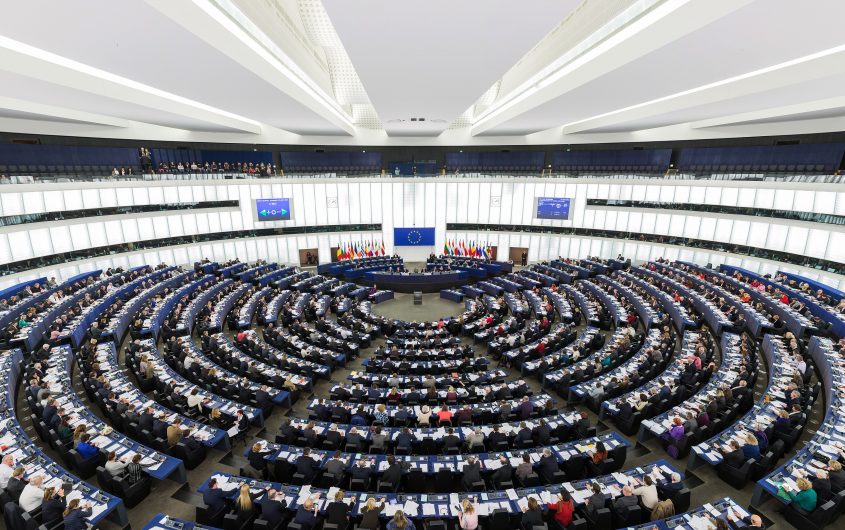
David Iliff via Wikimedia Commons
EU Elections: The Center Cannot Hold, but Do We Want It To?

Michael Trinkwalder
KU Eichstätt-Ingolstadt
Michael Trinkwalder was a Research Intern at AICGS for Summer/Fall 2018. Currently, Mr. Trinkwalder is pursuing a master's degree in International Relations at the KU Eichstätt-Ingolstadt in Germany. In his program, he concentrates on issues of foreign and security policy as well as diplomatic history. He is particularly interested in transatlantic relations, the future of the EU, the Common Foreign and Security Policy (CFSP), and Chinese foreign policy. Before joining AICGS, Mr. Trinkwalder spent time abroad studying in both the UK and China and worked as a project assistant at the Aspen Institute Germany. He is a founding member of the university group for foreign and security policy at the KU Eichstätt-Ingolstadt as well as a member of the Young European Federalists.
Populism has truly become a transatlantic phenomenon, transcending national borders and disrupting democracies throughout the Western world: from Brexit in the UK to the election of Donald Trump in the United States to government changes in Poland, Austria, and Italy. Now populists throughout Europe have set their sights on the 2019 elections for the European Parliament, with even Steve Bannon getting involved. If he succeeds in unifying the disparate forces of the European far-right into a coherent bloc, they could potentially paralyze the EU’s legislative process. Yet, even if he fails, the center-right European People’s Party (EPP) and the center-left Progressive Alliance of Socialists and Democrats (S&D) are projected to lose control of the European Parliament for the first time in nearly fifty years. But is this necessarily a bad thing?
Since its inception in 1952 as a purely advisory body, the European Parliament (EP) has steadily increased its influence and power. Paradoxically, as it has become more powerful, voter participation has declined in each European election. Many reasons for this development have been suggested such as the EU’s democratic deficit, its arcane set-up, or the fact that European elections are not truly European at all.
Among the most important reasons is certainly the impression that elections tend to change very little in the European Union. For years, the European Parliament has been dominated by an informal coalition of the center-right EPP and the center-left S&D, distributing EU offices and posts among themselves. This has largely turned European elections into a rather lethargic affair, with twenty-eight nations voting based on twenty-eight sets of issues in twenty-eight different national elections. Consequently, the elections for the European Parliament were treated as second-order elections with second-rate candidates by both political elites as well as the general public.
The elections for the European Parliament were treated as second-order elections with second-rate candidates by both political elites as well as the general public.
In 2014 the European Parliament forced the introduction of the lead-candidate (“Spitzenkandidaten”) process, where each pan-European party group selects a lead candidate, with the candidate of the party receiving the most votes being elected President of the European Commission. It was a substantial step toward the democratization of EU politics, even if it was a measure to which national leaders had to be dragged kicking and screaming. However, while the lead-candidate process is certainly a step in the right direction, it nevertheless failed to stabilize turn-out, which fell to a mere 42.54 percent in the 2014 election.
Ironically, it is the parties most opposed to the idea of the EU that are now driving the Europeanization of politics. In stark contrast to the centrist EPP and S&D, it is parties like the Alternative for Germany (AfD), Matteo Salvini’s League in Italy, or Marine le Pen’s National Rally (formerly the Front National) that have adopted a common political narrative of fighting against EU overreach and its political establishment. Yet, it is not just euro-skeptics that are becoming more transnational; there has been a veritable flood of newly formed parties, movements, and citizens’ initiatives. Among the most notable is the left-wing coalition “European Spring” (formerly Democracy in Europe Movement 2025) led by former Greek Minister of Finance Yanis Varoufakis that seeks to turn the EU into a “full-fledged democracy with a sovereign Parliament.”
It is not just euro-skeptics that are becoming more transnational; there has been a veritable flood of newly formed parties, movements, and citizens’ initiatives.
Some have cautioned that this nascent transnational debate comes at the cost of greater polarization between pro- and anti-EU forces, with the European elections turning into yet another episode of the “European civil war” of values, as French president Emmanuel Macron put it. However, by fixating on the seemingly inexorable march of populist nationalism and the threat this represents to the EU, we have lost sight of one of the most basic tenets of democracy.
There are few things more critical for the functioning of democracy than the existence of meaningful choice. The informal grand coalition of centrist parties has kept the EU stable but has robbed Europeans of the opportunity to change the direction of the European Union at the ballot box. Now, with the future of the European project on the line, the alternatives could not be starker. No longer can the European elections be dismissed as second-order elections. For better or for worse, this time the voters’ choice will matter. Europe’s mainstream parties should stop bemoaning the rise of populism and start taking the European election seriously, or risk being swept aside. Whatever else happens, we can certainly look forward to one of the most interesting European elections in decades.









